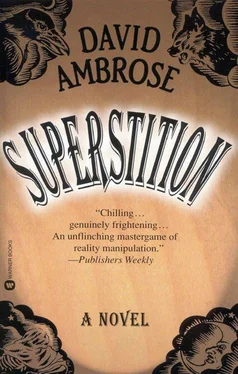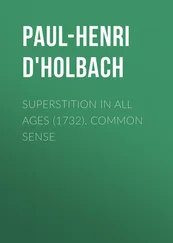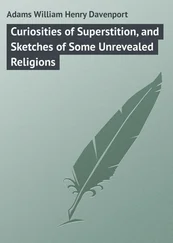David Ambrose - Superstition
Здесь есть возможность читать онлайн «David Ambrose - Superstition» весь текст электронной книги совершенно бесплатно (целиком полную версию без сокращений). В некоторых случаях можно слушать аудио, скачать через торрент в формате fb2 и присутствует краткое содержание. Жанр: Ужасы и Мистика, на английском языке. Описание произведения, (предисловие) а так же отзывы посетителей доступны на портале библиотеки ЛибКат.
- Название:Superstition
- Автор:
- Жанр:
- Год:неизвестен
- ISBN:нет данных
- Рейтинг книги:5 / 5. Голосов: 1
-
Избранное:Добавить в избранное
- Отзывы:
-
Ваша оценка:
- 100
- 1
- 2
- 3
- 4
- 5
Superstition: краткое содержание, описание и аннотация
Предлагаем к чтению аннотацию, описание, краткое содержание или предисловие (зависит от того, что написал сам автор книги «Superstition»). Если вы не нашли необходимую информацию о книге — напишите в комментариях, мы постараемся отыскать её.
Superstition — читать онлайн бесплатно полную книгу (весь текст) целиком
Ниже представлен текст книги, разбитый по страницам. Система сохранения места последней прочитанной страницы, позволяет с удобством читать онлайн бесплатно книгу «Superstition», без необходимости каждый раз заново искать на чём Вы остановились. Поставьте закладку, и сможете в любой момент перейти на страницу, на которой закончили чтение.
Интервал:
Закладка:
The only possible force causing the machine to move as it had been moving for the past twenty minutes was the will of the tiny caged chicks to keep it near to them. Like most baby birds, they had adopted as their mother the first moving object they had come in contact with on hatching from the egg. After their birth they had spent one hour every day for six days in the presence of the robot as it meandered on its random path. Today was the first time they had been caged and therefore unable to follow the machine in their accustomed way.
So, instead, they were making it come to them.
An hour later Pete brought in another cage of chicks to replace the first. The only difference was that these chicks had never seen the tychoscope before and therefore had no attachment to it. To establish this Sam did a twenty-minute control run during which the robot, as the computer printout confirmed, followed its normal random path while the chicks in their cage paid it no attention.
“Okay, Pete, pull the blinds, will you?” Sam said as soon as he had satisfied himself about the result. The lab became pitch dark, and the twittering of the chicks grew agitated.
“See what I mean?” Sam said. “They hate the dark during waking hours. It throws them into a panic.”
The noise that the chicks were making certainly bore him out. They subsided somewhat as a small flame leapt from Pete's lighter, which he touched to a candle. He attached the candle to a clip on top of the tychoscope, which had remained stationary on the far side of the floor since the end of the previous run.
When the candle was in place-the only source of illumination in the room-Sam pressed the switch on his remote. The tychoscope began to move.
The chicks clamored for the light to come to them…
“I'll never eat one of those things again,” Pete murmured as they analyzed the data after several runs. “The little buggers are magicians.”
Sam smiled. “Then you'd better become a vegetarian,” he said, “because anything more awake than a carrot could pull off what you just saw. And some people have theories about carrots.”
“You want to run a test with a basket of vegetables?”
“Nah-people would think we were nuts.”
“They already do.”
“Yeah, well,” Sam shrugged, “maybe we are.”
Pete shot a covert glance in his boss's direction. Sometimes he didn't understand Sam. By rights he should have been ecstatic at the results they were getting, but a sudden despondency seemed to have settled on him, as though everything they were doing was a waste of time.
“What's up?” he asked. “You found a flaw in the procedure, or what?”
“There's no flaw.” Sam's voice was flat.
“So why the long face?”
There was a flash of annoyance in Sam's look that warned the younger man to back off and not push the question further. But Pete wasn't in this job because he liked being told what to do or what to think. He respected Sam, liked him, and admired what he was doing; because of that he wanted to be taken into his confidence.
“Don't look at me like that,” he said, aware of a slightly whining note of protest in his voice that he disliked. “If there's something on your mind, I'd like to know.”
Sam sighed. It was a form of apology. “It's nothing to do with the experiment.”
“Then what's the problem?”
“The problem is figuring out what, if anything, it all adds up to.”
3
Joanna had appeared on television only once before. It had been an afternoon talk show following a series of articles she had written about junk diet treatments and the doctors who pushed them. She'd found the experience surprisingly painless. The trick, she realized, was not to perform; it was more effective to underplay than overplay, because the cameras captured everything. Keep your sentences short and the thoughts behind them clear.
Today's show was for the same slot, taped in the morning for transmission that afternoon. Joanna's article about the sleazy tricks at Camp Starburst had provoked the furor she had hoped it would. Now she found herself sitting alongside a male “channeler,” a female astrologer, and the author of a book about the ghosts of famous people who, supposedly, still walked the earth. The fifth guest was a psychologist called Sam Towne who was, apparently, doing “scientific research” into the paranormal at Manhattan University.
Joanna found the whole subject distasteful and the program pointless, but her editor had insisted that anything that hyped the magazine's profile, and incidentally hers, could only help circulation.
“Are you saying,” one woman from the audience asked, “that it's all a lie, all religion and everything, and there's nothing after death?”
“I'm saying,” Joanna replied, “that nobody knows what happens when we die, and anybody who claims to know for sure is a liar-and probably a crook as well.”
“But what about religious belief?” the host of the show asked, moving through the audience with his microphone. “Are you saying that all religion belongs in the same category of fraud as what you've been writing about?”
“No, of course I'm not. Religion is a different thing.”
“Do you mind if I ask if you have any religious beliefs yourself?”
“I was brought up in a Protestant family, I've never been a big churchgoer, but if you're asking whether I believe in God…I'd be hard pressed to say positively no.”
“Can I say something here?” The interruption came from Sam Towne, the psychologist. The host asked him to go on.
“Miss Cross was writing about people who claimed knowledge of the afterlife,” Towne said, “specific and detailed knowledge about people who had, as they like to put it, ‘passed over.’ Now we shouldn't confuse religious belief with that kind of knowledge, or indeed any kind of knowledge in the generally accepted sense. I know that I'm sitting in a television studio; so do you. There's no way we can disagree about that. But I may believe something about how I come to be here, how the studio comes to be here, how the world in which it exists comes to be here-and you may believe something else. Both our belief systems may be consistent with the facts as we know them, but inconsistent with each other. The phony psychics that Miss Cross was writing about had nothing to do with either religious belief or knowledge. They were running a straightforward confidence trick to make easy money.”
Predictably, the other three guests began protesting their agreement: the Camp Starburst affair had been a scandal, but an isolated incident; it should not be used as a brush to tar the whole psychic world.
As Joanna listened, the low opinion she had formed of them during the past hour did not improve. She had to admit a sneaking regard for Sam Towne, however. When she'd heard there was going to be a spook hunter on the show, she'd imagined some dour eccentric who spent his weekends in haunted houses trying to video the ghost. He turned out to be in his mid to late thirties, with an easy manner and a sense of humor. It was obvious that he was intelligent, his mind darting quickly but always clearly between topics; she could see from the monitor screens that he came over well on television.
The presenter gave Joanna the final word when he came to wind up the show. She confined herself to remarking that the psychic world may be one thing, but the multimillion-dollar industry it gave rise to was something of which people should be very suspicious indeed. The host signed off with a few words about the next day's show (incest-again), and a production assistant approached to unhook the guests‚ microphones.
Joanna declined an offer of coffee in the hospitality room. She wouldn't have minded talking longer to Sam Towne, but the other three depressed her, coming as they obviously did from the same mold of parasitic hypocrites as Ellie and Murray Ray.
Читать дальшеИнтервал:
Закладка:
Похожие книги на «Superstition»
Представляем Вашему вниманию похожие книги на «Superstition» списком для выбора. Мы отобрали схожую по названию и смыслу литературу в надежде предоставить читателям больше вариантов отыскать новые, интересные, ещё непрочитанные произведения.
Обсуждение, отзывы о книге «Superstition» и просто собственные мнения читателей. Оставьте ваши комментарии, напишите, что Вы думаете о произведении, его смысле или главных героях. Укажите что конкретно понравилось, а что нет, и почему Вы так считаете.








